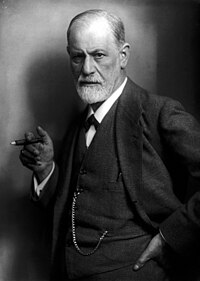Introduction to Psychology 1/IPSY101/History/Psychoanalytic theory
| “ | Being entirely honest with oneself is a good exercise. | ” |
| —Sigmund Freud | ||
Perhaps one of the most influential and well-known figures in psychology’s history is Sigmund Freud. Freud (1856–1939) was an Austrian neurologist who was fascinated by patients suffering from “hysteria” and neurosis. Hysteria was an ancient diagnosis for disorders, primarily of women with a wide variety of symptoms, including physical symptoms and emotional disturbances, none of which had an apparent physical cause.
Freud theorized that many of his patients’ problems arose from the unconscious mind. In Freud’s view, the unconscious mind was a repository of feelings and urges of which we have no awareness. Gaining access to the unconscious, then, was crucial to the successful resolution of the patient’s problems. According to Freud, the unconscious mind could be accessed through dream analysis, by examinations of the first words that came to people’s minds, and through seemingly innocent slips of the tongue (what are now referred to as "Freudian slips"). Psychoanalytic theory focuses on the role of a person’s unconscious, as well as early childhood experiences, and this particular perspective dominated clinical psychology for several decades (Thorne & Henley, 2005[1]).
Freud’s ideas were influential, and you will learn more about them when you study lifespan development, personality, and therapy. For instance, many therapists believe strongly in the unconscious and the impact of early childhood experiences on the rest of a person’s life. The method of psychoanalysis involves the patient talking about their experiences and selves. Although this method was not invented by Freud, it was certainly popularized by him and is still used today.
Many of Freud’s other ideas, however, are controversial. Drew Westen (1998[2]) argues that many of the criticisms of Freud’s ideas are misplaced, in that they attack his older ideas without taking into account later writings. Westen also argues that critics fail to consider the success of the broad ideas that Freud introduced or developed, such as the importance of childhood experiences in adult motivations, the role of unconscious versus conscious motivations in driving our behaviour, the fact that motivations can cause conflicts that affect behaviour, the effects of mental representations of ourselves and others in guiding our interactions, and the development of personality over time. Westen identifies subsequent research support for all of these ideas.
More modern iterations of Freud’s clinical approach have been empirically demonstrated to be effective (Knekt et al., 2008[3]; Shedler, 2010[4]). Some current practices in psychotherapy involve examining unconscious aspects of the self and relationships, often through the relationship between the therapist and the client. Freud’s historical significance and contributions to clinical practice merit his inclusion in a discussion of the historical movements within psychology.
References
- ↑ Thorne, B. M., & Henley, T. B. (2005). Connections in the history and systems of psychology (3rd ed.). Boston, MA: Houghton Mifflin Company.
- ↑ Westen, D. (1998). The scientific legacy of Sigmund Freud, toward a psychodynamically informed psychological science. Psychological Bulletin, 124, 333–371.
- ↑ Knekt, P. P., et al. (2008). Randomized trial on the effectiveness of long- and short-term psychodynamic psychotherapy and solution-focused therapy on psychiatric symptoms during a 3-year follow-up. Psychological Medicine: A Journal of Research In Psychiatry And The Allied Sciences, 38, 689–703.
- ↑ Shedler, J. (2010). The efficacy of psychodynamic psychotherapy. American Psychologist, 65(2), 98–109.
- Source
- This page was proudly adapted from Psychology published by OpenStax CNX. Oct 31, 2016 under a Creative Commons Attribution 4.0 license. Download for free at http://cnx.org/contents/4abf04bf-93a0-45c3-9cbc-2cefd46e68cc@5.52.
